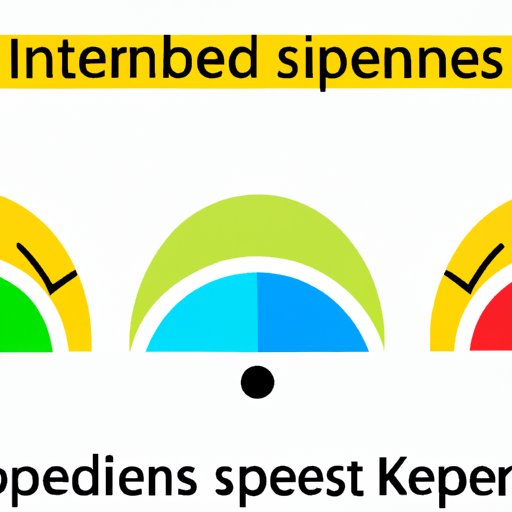Introduction
Internet speeds can be confusing. While most of us understand that a faster internet connection is better than a slow one, we often struggle to determine just how fast our connection really is. One common confusion is the difference between kilobits per second (kbps) and megabits per second (Mbps). In this article, we’ll explore how many kbps are in an Mbps, why knowing the difference between the two matters, how to calculate kbps to Mbps, the difference between the two in terms of speed and online activities, and practical tips to better understand internet speeds.
Understanding Internet Speeds: How Many Kbps Equal a Mbps?
To begin, it’s important to define kbps and Mbps. Kbps stands for kilobits per second. A kilobit is a unit of digital information that is equal to 1,000 bits. In computing, kbps is a measure of data transfer speed. Mbps, on the other hand, stands for megabits per second. A megabit is a unit of digital information that is equal to 1,000 kilobits or 1 million bits. Mbps is a measure of internet speed that is commonly used by internet service providers.
The main difference between kbps and Mbps is speed. An internet speed of 1 Mbps is significantly faster than an internet speed of 1 kbps. In fact, 1 Mbps is equal to 1,000 kbps.
For quick reference, here’s a conversion chart that shows how many kbps are in an Mbps:
| Mbps | Kbps |
|---|---|
| 1 | 1,000 |
| 5 | 5,000 |
| 10 | 10,000 |
| 25 | 25,000 |
| 50 | 50,000 |
| 100 | 100,000 |
Why Knowing the Difference Between Kbps and Mbps Matters
Knowing the difference between kbps and Mbps is important for a number of reasons. For starters, internet speeds can impact everyday activities such as browsing, video conferencing, and file sharing. Slow speeds can lead to a laggy and frustrating online experience.
Slow internet speeds also impact online gaming and streaming. Online gaming requires a reliable and fast internet connection to avoid lag and disconnections from the gaming servers. Streaming services such as Netflix, Hulu, and Amazon Prime Video require a minimum internet speed of 3 Mbps for standard definition and 5 Mbps for high definition viewing. Without sufficient internet speeds, streaming services may buffer or experience lag.
On the flip side, having faster internet speeds can greatly enhance online experiences. Faster speeds mean quicker downloads, smoother video conferencing, and better streaming quality.
Does Your Internet Speed Meet Your Needs? How to Calculate Kbps to Mbps
When determining how much internet speed is needed, it’s important to consider factors such as the number of people using the internet, the number of devices connected, and the online activities being performed.
To calculate the difference between kbps and Mbps, simply divide the kbps value by 1,000. For example, if your internet speed is 30,000 kbps, it is equal to 30 Mbps.
Mbps vs Kbps: What’s the Difference?
In terms of speed, Mbps is significantly faster than kbps. As previously mentioned, 1 Mbps is equal to 1,000 kbps. Mbps can support a variety of online activities, including video conferencing, online gaming, streaming, and more.
Internet service providers (ISPs) offer a variety of speed options, with some providing speeds of up to 1,000 Mbps. The faster the speed, the more expensive the plan. When choosing an internet plan, it’s important to consider the online activities being performed and the number of people using the internet within a household.
Internet Speeds 101: How to Make Sense of Kbps and Mbps
To better understand internet speeds, it’s important to remember that speed determines how quickly information is transferred from the internet to your device. Mbps is the most commonly used indicator of internet speed and is used by most ISPs. It is important to consider the online activities being performed and the number of users when choosing an internet plan.
When calculating the difference between kbps and Mbps, remember that Mbps is significantly faster than kbps. Mbps is the more common indicator of internet speed and is used by most ISPs. Remember to divide kbps by 1,000 to determine the Mbps value.
To ensure fast and reliable internet speeds, it’s also important to consider factors such as internet hardware and network optimization.
Conclusion
Understanding internet speeds and the difference between kbps and Mbps is crucial for optimizing online experiences. One Mbps is equal to 1,000 kbps and having faster internet speeds can greatly enhance online activities such as streaming, gaming, and browsing. Remember to consider the number of users and activities being performed when choosing an internet plan and always calculate kbps to Mbps to determine the true internet speed.
